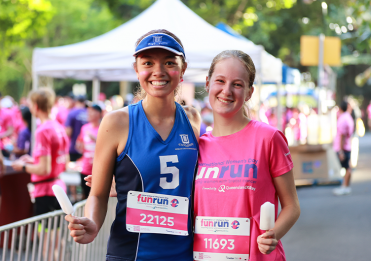The Keep on Moving series has focused on the concerning dropout rates of teenaged girls from sport and physical activity. Previous articles have addressed reasons why this is happening, despite the well-documented benefits activity has on the physical, psychological, and academic lives of girls as they transition from teenaged years to adulthood. The final article in the series will highlight approaches that can counteract these drop-out rates and hopefully help to reverse the trend.
Research suggests parents and guardians play a significant role in developing their daughter’s belief in their sporting competence and developing life-long engagement in competitive sport. The more parents participate in their daughter’s activities, the more likely their daughter will remain physically active. Strategies parents can utilise to show support are as simple as driving your daughter to practice, helping your daughter build a confident awareness of their ability, and watching their competitive matches. Other strategies include: ensuring the sporting environment girls are participating in fosters relationships among the players through camaraderie and team cohesion; providing pathways that cater to their progression of skills and assist in the setting of realistic goals to maintain participation; and encouraging your daughter to watch women’s sporting events and provide exposure to role models to whom they can aspire. The more parents participate and become actively involved, the more likely it is for their daughter to enjoy their sport in school life and beyond.
In addition to participation in competitive sports, research shows a large percentage of girls want to be physically active as they find movement enjoyable and worth repeating. Some girls seek competition, and some girls are in it for the fun. Again, parents and guardians play a key role in helping their daughter to be active by:
- opening conversations to identify any possible barriers preventing movement
- encouraging and fostering any interest in physical activity that can become a positive habit carried into early adulthood
- helping your daughter create a social group where activity is valued, and everyday experiences can be linked to movement.
In conclusion, the Cindi Lauper song, Girls just want to have fun, really rings true when it comes to physical activity and our teenaged girls, whether that be in a competitive or social environment. Our students need support to ensure physical activity is accessible, promoted, and an important part of their lives.
Ms Jane Gooden Mr Paul Pearce
Director of Sport Athlete Development Manager
Further reading:
Women’s Sports Foundation (April, 2019). Coaching Through a Gender Lens: Maximizing Girls’ Play and Potential. https://www.womenssportsfoundation.org/wp-content/uploads/2019/04/coaching-through-a-gender-lens-report-web.pdf
Women’s Sports Foundation (March, 2020). Keeping Girls in the Game: Factors that Influence Sport Participation. https://www.womenssportsfoundation.org/wp-content/uploads/2020/02/Keeping-Girls-in-the-Game-Executive-Summary-FINAL-web.pdf
Learn more about Sport opportunities at Brisbane Girls Grammar School by listening to our Illumine—From the Students episode.
Sports at BGGS
It’s undisputed that sports and physical activity are essential to our health and wellbeing, and research also tells us that the personal benefits go beyond the physical—helping us to sleep better, focus, and develop important skills such as teamwork and collaboration.
In this fourth episode of Illumine—From the Students, Principal of Brisbane Girls Grammar School, Ms Jacinda Euler Welsh, is joined by students and accomplished athletes, Emily and Zoe to discuss how they balance their sporting commitments with their studies, and hear first-hand the personal benefits of participating in sport at BGGS.




